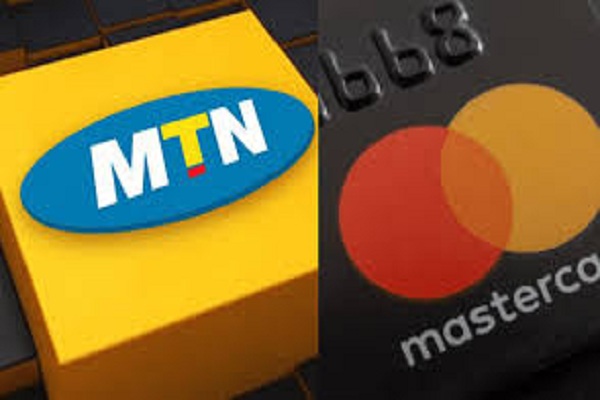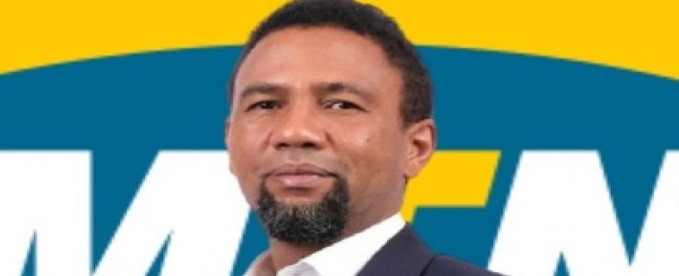Telecom
Mastercard, MTN Partners to Enable Global e-Commerce Payments Across Africa

Mastercard and MTN have entered into a strategic partnership to enable millions of consumers in 16 countries across Africa make global e-commerce payments safely and securely.

Through a Mastercard virtual payment solution linked to MTN MoMo (Mobile Money) wallets, consumers and merchants can engage with brands and businesses abroad through digital commerce, extending their reach to an international marketplace and unlocking a host of opportunities.
Across Sub-Saharan Africa, mobile devices are the primary channel used to connect to the internet.
According to GSMA, by 2025, it is estimated that there will be 300 million more people using their devices to access internet services.
In light of this significant growth, mobile financial services have become the dominant form of digital payments, with twice as many mobile money accounts as bank accounts in the region. As a result, consumers increasingly expect to have access to a broader range of digital financial services.
However, consumers and merchants are mostly restricted to a local base of online and offline businesses, therefore curtailing customers’ ability to engage in global commerce.
Through this strategic partnership, MTN customers with a Mastercard virtual payment solution linked to their MoMo wallets can make payments to global online merchants through a seamless and secure digital payment experience on websites and mobile applications. The service is available regardless of whether or not the customer has a bank account.
The solution will enable consumers to explore and shop at well-known global e-commerce brands and pay quickly and securely for leisure shopping, travel, accommodation, entertainment, streaming services and more. It will also allow small business owners to purchase from suppliers abroad and pay with the virtual payment solution.
Serigne Dioum, chief Digital and Fintech Officer, MTN Group, said, “We are very excited about this partnership with Mastercard, which is another step in realizing our ambition to build Africa’s largest fintech platform, accelerating economic and social development through digital innovation to the benefit of citizens across the continent and beyond.
“This noteworthy partnership is another step to enable our customers to participate in the global economy.
“We are resolute that accelerated financial inclusion is a potent enabler of socio-economic development that empowers the most vulnerable in society,” he concluded.
Amnah Ajmal, executive vice president for Market Development, Mastercard Middle East and Africa, said: “This significant milestone will enable millions of MTN customers to benefit from global digital commerce and drive digital and financial inclusion across Africa through easy and secure access to financial services.
“At Mastercard, our innovation strategy is based on partnerships and collaboration. This agreement with MTN shows that we can deliver innovative digital solutions that have a far-reaching impact and realize the true potential of inclusive growth across the continent.
“Partnering with MTN allows us to accelerate our global pledge to connect 1 billion people to the digital economy by 2025, bringing us closer to a world beyond cash.”
MTN and Mastercard first launched the digital payment solution in 2018 for MoMo customers.
MTN, the largest mobile network operator, is the ‘Most Admired African Brand’ based on spontaneous consumer responses in Brand Africa 100: Africa’s Best Brands 2020 survey and the most valuable telecoms brand in Africa by Brand Finance Africa.
The company will extend the virtual payment solution offering throughout its Fintech footprint.
The expansion of this payment solution will play a significant role in driving the growth of digital inclusion and e-commerce thus increasing MTN MoMo customer inclusion into the global economy.
Initially designed to facilitate the transfer of cash between mobile users, MTN’s MoMo offering is now much broader – including loans, insurance, remittances and payments.
Telecom
PAT Taps Osi as CEO

Pan African Towers (PAT), a Nigerian infrastructure provider serving 9mobile and Spectranet, has appointed Echezona Osi as chief executive officer.

Echezona Osi
Adefolarin Ogunsanya, company’s, board chairman, explained in a statement that Osi would succeed Oladipo Badru, whose tenure lasted nine months in acting CEO position. Osi has more than 28 years of experience in the telecommunications sector across various regions of Africa.
Prior to his appointment as CEO, he had served as the head of network deployment at Airtel Nigeria, operations director and chief technical information officer at MIC Tanzania, chief technology officer roles at IPT PowerTech Nigeria, Rhino Niger Networks and Biswal Nigeria.
He obtained a degree in electrical/ electronic engineering from the University of Benin and a postgraduate diploma in data science and business analytics from the University of Texas.
Telecom
NCC Introduces N10m Licence Fee for Bulk SMS Service

Companies sending bulk international text messages, also known as Application-to-Person (A2P) messages, will now have apply for a licence that costs N10 million.

This is part of new rules introduced by the Nigerian Communications Commission (NCC) aimed at cleaning up the system, fighting fraud, blocking spam messages and stopping money from leaving the country unchecked.
These A2P messages are the kind customers get from banks, online stores, hospitals and political campaigns, automated texts sent from apps to their phones.
According to the commission, the bulk international text message system has been poorly regulated, allowing misuse and invasion of privacy.
“The International SMS Service Ecosystem in Nigeria has not been fully brought under regulatory control. It has been observed that the excessive use of the Short Message Service has led to fraud, spam and illegal activities,” the NCC said.
The regulator warned that without action, the problem would worsen as more people use mobile phones and digital services.
To solve this, the NCC is creating a central platform, or gateway, through which all international bulk text messages must pass through.
The agency said this would help to monitor messages in real time, ensure proper fees are paid, and make sure the money stays in Nigeria where it can contribute to the economy.
As part of the incoming change, service providers must follow strict rules, including strong data protection, spam filters, and message encryption.
Also, they must also work with local mobile networks and make sure all messages come from a verified sender
The NCC warned that any message without a proper sender ID will be blocked and not delivered to users.
To protect users from unwanted texts, the new rules say companies must get clear permission before sending any promotional content.
The rule also says people must also be able to choose whether they want to receive such messages or not.
Companies are now required to keep records of all messages for at least six months and must clearly state all charges involved.
The NCC said fees for help requests, cancellations, or service info must be transparent and not include hidden charges.
The commission will issue licences to several providers to encourage healthy competition but may limit new licences if needed.
Only companies that show they can stop fraud and safely deliver messages will be allowed to operate. They must also regularly report their message traffic and finances to the NCC.
It warned that any company that breaks the rules risks getting fined, suspended, or having its licence revoked.
Offences like charging illegal tariffs, ignoring security rules, or avoiding taxes will be punished, the NCC said.
The commission added that the new rules follow the Nigerian Data Protection Act 2023 and support the federal government’s goal of strengthening cybersecurity and controlling Nigeria’s digital space.
The framework will also be reviewed from time to time to keep up with new technology and market trends.
Telecom
MTN Nigeria Targets $1Bn Cloud Market with Largest Modular Data Centre

MTN Nigeria has launched what it claims is the country’s largest prefabricated modular data centre, marking a bold push into the country’s fast-growing cloud market and taking aim at global giants such as Amazon Web Services, Microsoft Azure and Google Cloud.

Karl Toriola, CEO, MTN Nigeria.
The shift comes as demand for cloud services in Nigeria soars — driven by the uptake of mobile apps, fintech tools and e-learning platforms — while foreign providers have become costlier in the wake of the naira’s sharp devaluation.
“This is one of the biggest data centres in West Africa and probably one of the biggest in Africa,” said Karl Toriola, CEO, MTN Nigeria.
He described the new Tier III-certified facility, with locally hosted cloud services, as “transformative for the technology ecosystem in Nigeria and very supportive of the federal government’s agenda”.
MTN Nigeria, the country’s largest telecoms provider, has so far invested $120m in the first phase, delivering an IT load of 4.5MW. A second phase, set to double capacity to 9MW, is budgeted at $135m.
“We already have data centres that are running our existing capacities,” Toriola said.
“We will go to 9MW in short order, possibly 14MW, and we can expand even further.”
He said the facility would allow local hosting for tech developers, large enterprises including banks and oil companies, and government agencies — markets long dominated by foreign cloud providers.
“Multinational companies such as Netflix, Facebook and Instagram can also host a lot of their data here. That improves the quality of service and reduces the cost of storage,” he added.

 Broadcasting1 day ago
Broadcasting1 day agoNigeria Week Ahead: Inflation, Oil and Naira in focus

 News1 day ago
News1 day agoEFCC: Accusations Against Our Chairman Are Baseless and Misleading

 Broadcasting4 hours ago
Broadcasting4 hours agoA Billion-Dollar Obsession in 90-Second Bites

 General News2 hours ago
General News2 hours agoWoodhall Capital and Partners Launch ₦1.5Bn Fund

 General News2 hours ago
General News2 hours agoAM Best Reaffirms Stable Outlook for Cyber Insurance Market

 News2 hours ago
News2 hours agoExperts Urge MSMEs to Build Strong Partnerships in Solving Problems,

 News2 hours ago
News2 hours agoFirstBank, NLNG, Shell back QEDNG Creative Powerhouse Summit

 Telecom2 hours ago
Telecom2 hours agoMTN Nigeria Targets $1Bn Cloud Market with Largest Modular Data Centre


























